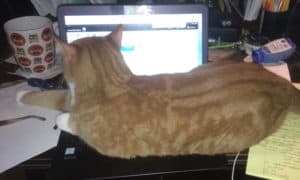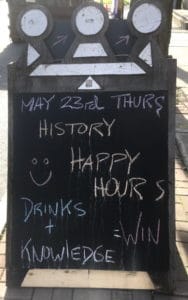Living in a Digital World
By John Marks, Curator of Collections
At this writing, I’m on my second week at working from home. My activity report for last week looks normal for this time of year – lots of research and writing, and email correspondence ( You can read an earlier article on the writing process). However, it’s not normal.
 There’s the matter of routine. Getting into my car signifies the beginning of the workday. Then there’s driving time, making coffee, and exchanging pleasantries before I start to work. Now, walking downstairs signifies the potential start of work. I can avoid looking at my desk, but I know it’s waiting for me. I also have to negotiate with my cat for access to the laptop.
There’s the matter of routine. Getting into my car signifies the beginning of the workday. Then there’s driving time, making coffee, and exchanging pleasantries before I start to work. Now, walking downstairs signifies the potential start of work. I can avoid looking at my desk, but I know it’s waiting for me. I also have to negotiate with my cat for access to the laptop.
History is a social pursuit. It’s the stories of people interacting with each other, for good or ill. The museum staff has its own history (all good!) as we pursue history together. With five people in a three-story building, we may not see each other much, but we do sit down every week to discuss projects and plans. It only takes a few conference phone calls, our current meeting method, to realize face-to-face contact is important.
We’re well prepared for this situation. Our work is on computers. We don’t have access to the archives and artifacts, but some of it is available online. Over the last seven years we’ve built up our online presence to reach Genevans who may not, or can’t, come to the museum. Our website has a blog, photos, videos, podcasts and past exhibits . We post photos to Facebook , and we recently began an Instagram account. We’re focusing on providing new online content while the museum is closed.
Still, I miss speaking to public audiences. Since last year, I’ve been presenting at the Living Center of the Geneva Hospital every other month. The residents enjoy the old photos and I’ve picked up a lot of information about Geneva through personal stories. The Living Center limited access to their building in early March.
My favorite current program is History Happy Hour at Lake Drum Brewing on East Castle Street. Begun a year ago, it’s a captioned, continuous loop Powerpoint show on one topic. Each one is between eight and ten minutes long, so people can watch once and leave, or watch it a few times. It’s a departure from traditional history lectures that last an hour and involve sitting and listening.
The important thing, from a professional standpoint, is that it brings people together over a common interest. I don’t do the talking, I stand in the back and let people talk to each other about the photos on the screen. I see many conversations between strangers. I see Hobart & William Smith professors talking with locals. Public history isn’t just the history we, from the museum, present, it’s the history people create for themselves and share with others.
I doubt there will be an April or May History Happy Hour this year. We will announce the next one when public gatherings resume. In the meantime, several past Powerpoints were turned into videos and can be found at our website. I look forward to seeing everyone in person again!
Notes:
Victor and Jenna Pultinas, owners of Lake Drum, make our History Happy Hours possible. They are HWS graduates who are committed to making themselves and their business part of Geneva.
Geneva newspapers, up to the 1920s, can be seen at nyshistoricnewspapers.org. There are photos, postcards, and other collections at newyorkheritage.org. Click on Contributors, then G to find us. The Geneva Public Library is also there and has the city directories and more photographs.
What might future historians and generations need to understand the COVID-19 Pandemic? All of us have a story to tell on how the pandemic is affecting our lives. Are you in an at-risk group or have someone in your home who is? How has the stay-at-home order affected you? Do you shop less or use a grocery delivery service? For students at home, what has your experience been like? What is your new normal? Join the Geneva Historical Society in documenting this historic moment through “We Stay At Home: A Record of Geneva During the 2020 Pandemic.” Share your story through narratives (a letter, poem, song, recipes, and short story), images (photographs, screenshots of social media, memes), audio, videos, and files (emails, flyers, announcement, text messages, tweets). To share your story, go to https://historicgeneva.org/programs-and-exhibits/we-stayed-at-home/.

